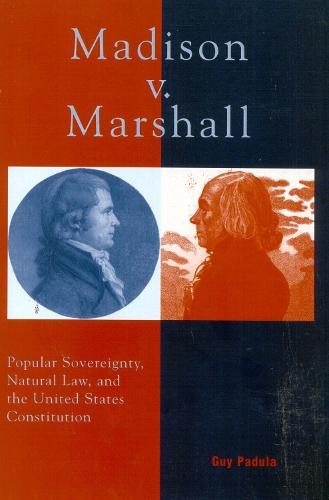
Madison v. Marshall: Popular Sovereignty, Natural Law, and the United States Constitution
(Paperback)
Publishing Details
Madison v. Marshall: Popular Sovereignty, Natural Law, and the United States Constitution
By (Author) Guy Padula
Bloomsbury Publishing PLC
Lexington Books
3rd May 2002
United States
Classifications
Tertiary Education
Non Fiction
Constitutional and administrative law: general
History: specific events and topics
342.73029
Physical Properties
Paperback
208
Width 153mm, Height 229mm, Spine 15mm
327g
Description
Popular sovereignty or natural law At a time of constitutional crisis in the American body politic, Guy Padula's work suggests that the answers to heated political debate can only be found by scrutinizing the past. In "Madison v. Marshall" Padula turns the spotlight on the interpretive intent of America's founding fathers to discover if the consent of the people or the rule of justice triumphs. Comparing the constitutional theories of the founding generation's two pre-eminent constitutional authorities Padula shatters the Originalist "myth" that Madison and Marshall shared a compatible constitutional jurisprudence. He concludes that the meaning of the Constitution has been contested from the outset. This should be useful reading for legal scholars, political scientists and historians seeking to learn more about the fundamental nature of US law and how it should be interpreted.
Reviews
The volume is therefore a very welcome and provocative contribution to the discussion over whether the founding generation favored a constitutional jurisprudence of 'original intent' or one based on the application of universal principles of justice. -- Philippa Strum, The City University of New York
How should the U.S. Constitution be interpreted Padula demonstrates that the two authorities at the time of the founding of the Republic, James Madison and John Marshall, could hardly agree whether the Constitution's meaning is fixed once and for all or remains subject to change in response to new developments. This learned and insightful book is a valuable resource for citizens as well as scholars. -- John Patrick Diggins, The City University of New York
In Madison v. Marshall Guy Padula has written with great erudition and lucidity about two fundamental approaches to constitutional interpretation developed by the Founders. His book will stimulate new ways of thinking about 'originalist' interpretations and can help our own generation think through the questions of constitutional meaning and the role of the courts in shaping it. -- Richard M. Pious, Barnard College
Author Bio
Guy Padula received his Ph.D. from The City University of New York. He is currently attending Benjamin N. Cardozo School of Law.
